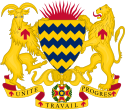2023 Chadian constitutional referendum
 |
|---|
|
|
A constitutional referendum in Chad was held on 17 December 2023,[1][2] with provisional results set to be announced on 24 December.[3] The referendum was on a new constitution formulated following the death of President Idriss Déby in 2021.[4] The draft had been approved by the National Transitional Council on 27 June.[5]
Campaign[edit]
The "yes" vote was endorsed by the military-led National Transitional Council headed by General Mahamat Deby, the former ruling Patriotic Salvation Movement (MPS) and the main opposition UNDR of Prime Minister Saleh Kebzabo.[6] Smaller parts of the opposition and rebel groups supported a "no" vote or said they will boycott the referendum.[7]
Conduct[edit]
The referendum has been criticized for a lack of transparency around voter registration and an audit of the physical infrastructure and technology needed to conduct the referendum.[8]
Contents[edit]
The new draft aimed to replicate elements of the 1996 constitution.[9][10]
- Chad is defined as a decentralized unitary state operating under a semi-presidential system of government (reverting the change to a full presidential system that had been made in 2018).
- The term of office of the president was reduced from six years to five years, with re-election permitted once. The minimum age for presidential candidates was also lowered from 40 to 35, with candidates required to have been born a citizen of Chad to Chadian parents.
- The draft constitution also ratifies the existence of the Senate, the upper house of the legislature theoretically created by the 2018 constitution but never implemented.
- The country is to be divided into 23 regions, or provinces.
- The independence of the judiciary was strengthened, with the presidency of the Superior Council of the Judiciary being awarded to the President of the Supreme Court (in the current constitution, the President of the Supreme Court holds the lesser position of second vice-president, behind the President and the Minister of Justice."
- The National Election Management Agency is to be set up as an independent and permanent structure to manage all electoral and referendum-related operations. It replaces the Independent National Electoral Commission, which had previously been directly under the government.
- The High Court of Justice (previously a chamber of the Supreme Court) becomes an independent institution again. "It is the only court empowered to judge the President of the Republic, the presidents of major institutions, and members of the government as well as their accomplices in cases of high treason and similar cases."
- The Constitutional Council (previously the third chamber of the Supreme Court) will regain control over "reviewing the constitutionality of laws, international treaties and agreements, organic laws and other laws on public freedoms and fundamental rights. It is the institution that will administer the oath of the elected President of the Republic, rule on disputes in national elections, and regulate the functioning of institutions and the activities of public authorities", etc.
- The National Commission for Human Rights, an independent administrative authority intended to promote and safeguard human rights and fundamental freedoms, is established.
- The Ombudsman of the Republic, "an independent administrative authority which will participate in the peaceful settlement of conflicts, receive complaints concerning the functioning of the public administration, autonomous communities, public establishments and other entities vested with a public service mission" is established.
Results[edit]
On 24 December 2023, according to the provisional results of the constitutional referendum, the yes vote won by 86%, compared to 14% for the no, according to the National Commission responsible for the organization of the constitutional referendum (Conorec). Turnout was approximately 63.75%.[11]
References[edit]
- ^ "Chad holds referendum on new constitution amid opposition protests". Al Jazeera. Retrieved 19 December 2023.
- ^ "Chad holds referendum on new constitution to end military rule". www.aa.com.tr. Retrieved 19 December 2023.
- ^ "Voting ends in Chad constitutional referendum". New Vision. Retrieved 22 December 2023.
- ^ "Road To Chad's Constitutional Referendum - Biometric Electoral Roll Update | EISA". www.eisa.org. 21 August 2023. Retrieved 19 September 2023.
- ^ "Tchad: le projet de nouvelle Constitution adopté par le Conseil national de transition". RFI (in French). 27 June 2023. Retrieved 19 December 2023.
- ^ "Chad holds divisive post-coup constitutional referendum – DW – 12/17/2023". dw.com. Retrieved 18 December 2023.
- ^ Ramadane, Mahamat (18 December 2023). "Chad holds divisive post-coup constitutional referendum". Reuters.
- ^ Eizenga, Daniel; Nodjimbadem, Katie (28 November 2023). "Chad's Constitutional Referendum Promises a Transition without Change—or Stability". Africa Center for Strategic Studies. Retrieved 19 December 2023.
- ^ Mahamat, Malick. "Tchad : zoom sur les innovations du projet de Constitution". Alwihda Info (in French). Retrieved 19 December 2023.
- ^ "Chad's Proposed New Constitution: Between Hopes for Refoundation and an Uncertain Future". ConstitutionNet. Retrieved 19 December 2023.
- ^ "Référendum constitutionnel au Tchad: le «oui» l'emporte à 86%, selon les résultats officiels provisoires". RFI (in French). 24 December 2023. Retrieved 25 December 2023.
